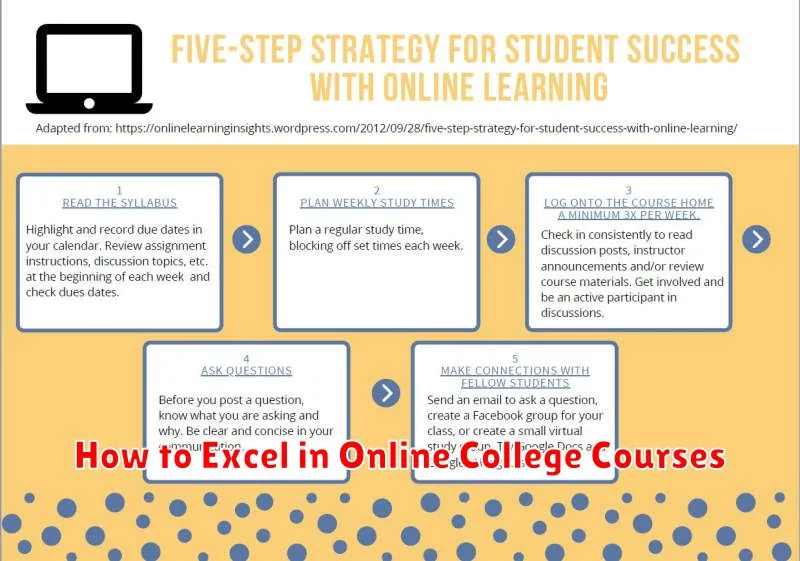Are you ready to embark on your online college journey? Navigating the world of virtual classrooms can be daunting, but with the right strategies, you can not only survive but truly excel in online college courses. This comprehensive guide will provide you with actionable steps and invaluable insights to help you succeed in the digital learning environment. From mastering time management and effective study techniques to leveraging online resources and fostering communication with instructors and peers, we’ll equip you with the tools you need to achieve academic excellence in your online studies. Whether you’re a seasoned online learner or just beginning, discover how to thrive and reach your full potential in the dynamic landscape of online college courses.
Online college courses offer flexibility and convenience, but they also demand self-discipline and effective learning strategies. This introduction lays the foundation for success by outlining key areas essential for thriving in the online learning environment. We’ll delve into the importance of time management, explore proven study techniques tailored for online college courses, and emphasize the significance of active communication. By implementing the guidance provided in this guide, you can transform the challenges of online learning into opportunities for growth, ultimately achieving excellence in your academic pursuits and maximizing the benefits of your online college experience.
Creating a Dedicated Study Space
A dedicated study space is essential for success in online learning. It signals to your brain that it’s time to focus and minimizes distractions. This doesn’t necessarily mean a whole room; a quiet corner or even a specific seat at the kitchen table can suffice.
Key elements of a productive study space:
- Comfortable Seating: Ensure your chair provides adequate support to prevent discomfort during long study sessions.
- Proper Lighting: Good lighting reduces eye strain. Natural light is ideal, but a good desk lamp is also effective.
- Organization: Keep your materials, such as textbooks, notebooks, and pens, readily accessible and organized.
- Minimal Distractions: Inform family members or housemates of your study schedule and minimize interruptions. Turn off social media notifications and silence your phone.
Establishing a dedicated study space helps cultivate a productive learning environment and fosters a positive mindset toward your online coursework.
Using a Weekly Study Planner
A weekly study planner is a crucial tool for online learning success. It provides structure and helps you stay organized, allowing you to dedicate the necessary time to each course.
Start by listing all your weekly commitments, including classes, work, and personal appointments. Then, allocate specific time slots for studying each subject. Consider factors like due dates, exam schedules, and the complexity of the material when determining study times.
Break down large assignments into smaller, manageable tasks. This approach makes the workload less daunting and allows you to track your progress effectively.
Consistency is key to successful online learning. Stick to your schedule as much as possible, treating study time like any other important appointment.
Regularly review and adjust your planner as needed. Unexpected events may arise, and flexibility is important. A weekly planner isn’t meant to be rigid, but rather a guide to help you stay on track.
Participating in Virtual Discussions

Active participation in online discussions is crucial for success in online college courses. It allows you to engage with the course material, share perspectives, and learn from your peers. Meaningful contributions demonstrate your understanding of the subject matter and enhance your overall learning experience.
Prepare before participating by reading the assigned materials and formulating thoughtful responses. Address the discussion prompts directly and support your points with evidence or examples. Engage respectfully with your classmates by acknowledging their contributions and responding constructively to their ideas.
Time management is also key. Allocate specific times in your schedule to participate in discussions. Regular and timely engagement will help you stay on track and contribute effectively to the ongoing conversation.
Avoiding Distractions

Minimizing distractions is crucial for success in online learning. A dedicated study space free from interruptions is essential. This could be a home office, a library, or even a quiet corner in a coffee shop. Inform family or housemates about your study schedule so they can respect your need for uninterrupted time.
Technology can be both a tool and a major distraction. Turn off social media notifications, silence unnecessary apps, and consider using website blockers to prevent yourself from straying onto non-educational sites during study sessions. Utilize productivity apps or browser extensions specifically designed to enhance focus.
Time management also plays a key role in minimizing distractions. Creating a structured study schedule and adhering to it helps establish a routine and minimizes the likelihood of procrastination. Break down large assignments into smaller, more manageable tasks to maintain focus and motivation.
Staying in Contact with Professors
In the online learning environment, proactive communication with your professors is essential for success. While you may not see them face-to-face, maintaining contact helps you stay engaged, clarifies any confusion, and builds a valuable rapport.
Utilize the communication tools provided by your online learning platform. This might include email, announcements, or discussion forums. Regularly check these platforms for updates and important information.
Don’t hesitate to reach out to your professors with questions about the course material. Clarifying doubts early on can prevent misunderstandings and ensure you stay on track. Be specific in your inquiries, referencing the particular assignment or topic you need help with.
While email is often preferred for individual questions, participate actively in online discussions and group projects. This demonstrates your engagement and allows you to learn from your peers as well as your professor.
Taking Notes from Lectures

Effective note-taking is crucial for online learning. Actively listening and summarizing key concepts will significantly improve your comprehension and retention of the material.
Several methods can enhance your note-taking process. Consider the Cornell Method, which divides your page into sections for notes, cues, and summaries. This structure promotes active recall and efficient review.
Alternatively, the sketchnoting method combines drawings and keywords to visually represent information. This technique can be particularly useful for visual learners. Experiment with different methods to find what works best for you.
Digital note-taking tools can also be invaluable. Many platforms offer features such as audio recording, searchable text, and cloud storage. Leverage these tools to streamline your workflow and create a readily accessible repository of information.
Regardless of your chosen method, remember to review your notes regularly. Consistent review reinforces learning and helps you identify any gaps in your understanding.
Practicing Self-Motivation
Online learning requires a high degree of self-motivation. Without the structure of a traditional classroom, the onus is on you to stay engaged and on track.
Time management is crucial. Create a realistic study schedule and stick to it as much as possible. Treat your online classes as you would in-person classes, allocating specific times for studying, completing assignments, and participating in discussions.
Establish a dedicated study space. Having a designated area free from distractions will help you focus and maintain a productive mindset.
Active participation is key. Engage with the course material, participate in discussions, and ask questions when needed. This will help you stay motivated and better understand the content.
Finally, reward yourself for your accomplishments. Acknowledging your progress, whether it’s completing a challenging assignment or finishing a module, will help maintain momentum and reinforce positive study habits.

